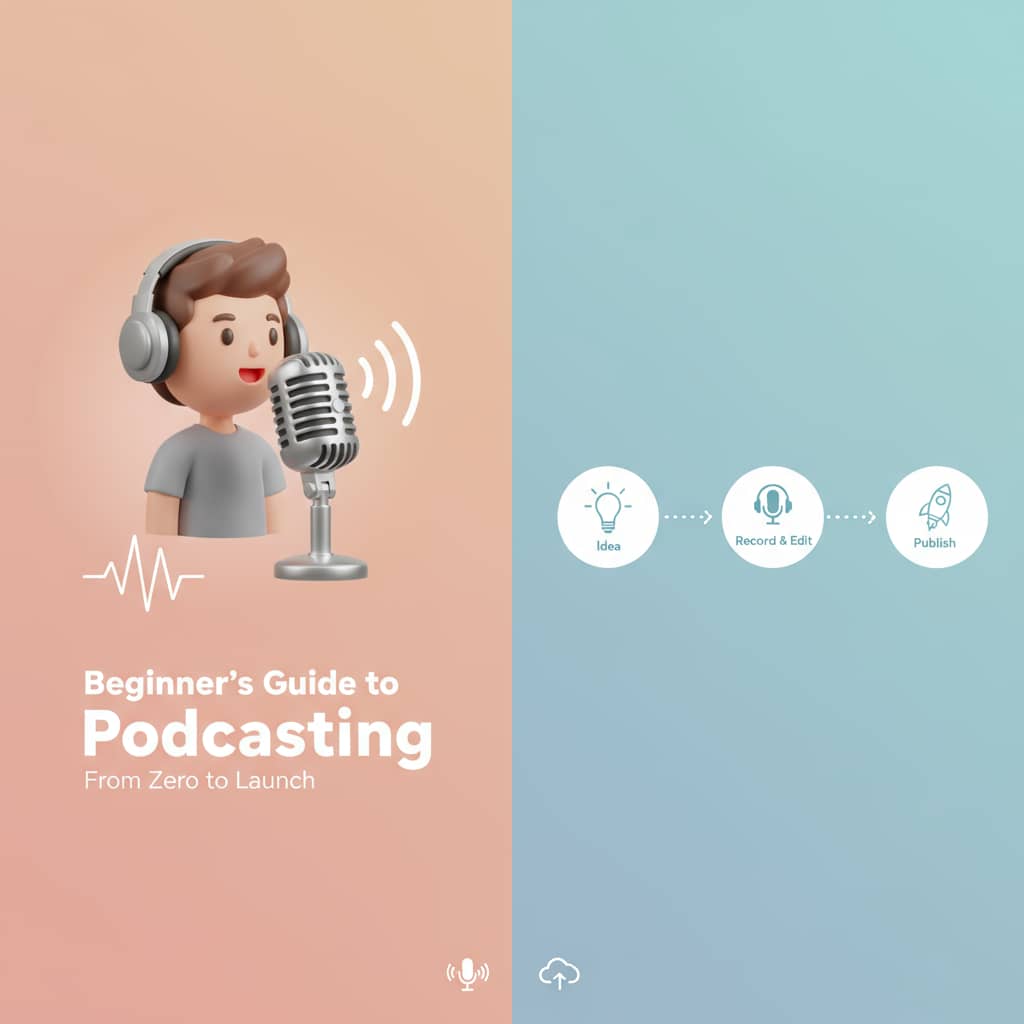Let me tell you a little secret, the first time I ever heard the word “podcast,” I thought it was some Apple thing for rich tech bros with fancy mics. 😂
But these days, anybody with a decent phone, a clear voice, and something interesting to say can build a podcast. And that’s the beauty of it. Podcasting has gone from “elitist media” to “your neighbour sharing real talk.”
Maybe you’ve been thinking about starting one to share stories, teach, gist, motivate, or even rant about relationships, football, or crypto. But somehow, you keep postponing. You’re waiting to buy a studio mic, or maybe you feel nobody will listen. Relax. We all start from that same spot which is at zero level.
So, grab your phone or laptop, sit back, and let’s talk about how you can start your podcast today, no excuses, no confusion, just pure, practical gist.

1. Start With Why (Seriously, Why Do You Want a Podcast?)
Before you buy a mic or open Spotify for Podcasters, you need to know why you’re doing this.
Do you want to educate people? Entertain them? Promote your brand?
Your “why” is your anchor. It’s what’ll keep you consistent when you record episode 10 and you’ve only got three listeners (two of them being your friends who forgot to unsubscribe 😅).
There is a say that “When purpose is clear, persistence becomes easy.” And that’s exactly how podcasting works.
If your goal is to help young people learn about money, build your episodes around that. If you just want to tell funny stories, own it. Your voice doesn’t have to sound like CNN, it just has to be authentic.
2. Pick a Niche You Actually Enjoy Talking About
Nothing kills a podcast faster than boredom, not even the audience’s. You can’t fake passion. If you don’t enjoy what you’re saying, trust me, people will hear it in your tone.
Pick a topic you can talk about for hours without getting tired:
- Tech and gadgets
- Lifestyle and motivation
- Finance and business
- Music and pop culture
- Faith and relationships.
You don’t have to copy anybody. Just pick something that feels natural to you. The goal is to make your listener feel like they’re sitting beside you while you gist.
3. Equipment – Start Small, Don’t Go Broke
Here’s where most people get stuck. They see YouTubers with fancy mics and pop filters and think, “Ah, I can’t afford this yet.”
Let’s be honest, your smartphone is enough to start. Yes, that same phone you use for WhatsApp voice notes.
Record using free apps like:
- Spotify for Podcasters (Anchor) — record, edit, and publish directly.
- Audacity (for laptop users) — free and easy.
- CapCut or VN Video Editor (if you want to mix audio with visuals).
If you want to upgrade later, get a budget mic like:
- Fifine K669 (cheap and clear)
- Boya BY-M1 (for phones)
- Samson Q2U (if you want to sound pro)
And please make sure you record in a quiet room. Turn off your fan, close the door, tell your siblings to pause whatever could affect your recording.
4. Craft Your Format – Don’t Just Wing It
You need a structure. Are you doing solo episodes? Interviews? Panel discussions? Pick one and stick with it till you find your rhythm.
Solo format: Easy to start. You just talk about topics you love.
Interview format: Great for networking. You bring guests and build credibility.
Panel format: Fun and dynamic but needs coordination.
Most successful podcasters keep their episodes between 20 and 45 minutes, short enough to keep attention, long enough to deliver value. And before you record, make a rough outline. Even if it’s just bullet points on your phone like:
- Intro (why this topic matters)
- Story or example
- Main points
- Closing punchline
It’ll save you from sounding like a lost person.
5. Create a Killer Intro and Outro
First impressions matter, even in audio. You don’t need Drake’s producer. Just a simple intro like:
“Hey everyone, welcome to The Real Talk Podcast, where we share unfiltered stories about money, mindset, and making moves.”
Then a short background beat (you can get royalty-free sounds from Pixabay, Mixkit, or YouTube Audio Library).
End with something memorable, like:
“Thanks for tuning in! If you loved this, share with your friends — don’t be stingy with good vibes.”
That small signature outro can make your brand stick in people’s heads.
6. Pick a Hosting Platform (The Home of Your Podcast)
Your audio needs a place to live online and that’s what a hosting platform does.
Free options that actually work:
- Spotify for Podcasters (Anchor) – Free, simple, global reach.
- Podbean – Also free with analytics.
- Buzzsprout – Beginner-friendly, with auto-distribution.
- RedCircle – Great for monetization later.
Once you upload, the platform automatically distributes your episodes to Spotify, Apple Podcasts, Google Podcasts, and more.
So basically, you record once and boom! You’re global.
7. Branding – Give Your Podcast an Identity
People judge with their eyes before their ears. So, design a clean cover art, something bold, readable, and unique. You can use Canva or Fotor to create one. Add your name, your podcast title, and a strong colour scheme that matches your vibe. Also, write a short bio that sells your story:
“Every week, we dive into real-life lessons on business, purpose, and culture. One honest conversation at a time.”
Your brand is your personality on display. Make it sound human, not robotic.
8. Promote Like a Hustler
Let me tell you, your podcast won’t magically trend. You’ve got to push it.
Share snippets on WhatsApp status.
Post short clips on TikTok and Instagram Reels (people love seeing the face behind the voice). Join online communities like Rising Creators Forum
And don’t be shy to ask people to listen, not in a spammy way, but with value.
Example:
“Hey guys, just dropped a 20-minute episode on how to stop procrastinating, might be the push you need today.”
If you’re consistent, your audience will grow slow but steady.
9. Monetize Your Podcast
Ah, the part everyone loves is money.
Once your podcast starts gaining listeners, there are many ways to earn:
- Sponsorships and brand deals
- Affiliate marketing
- Donations via platforms like Patreon or BuyMeACoffee
- Selling your products or services
- Ads via Spotify or Podbean
You don’t need a million listeners to start. Even a small loyal audience can generate income if your content connects.
10. Be Consistent — That’s the Real Secret Sauce
Forget everything else, consistency is the backbone of success.
Release your episodes weekly or bi-weekly and stick to your schedule. Even if the first ten episodes don’t get many plays, don’t quit. Remember, podcasting is a slow burn. The more you show up, the more people trust your voice.
You’re not just building a podcast, you’re building a community. And one day, someone will message you saying, “Your episode helped me get through a tough time,” and that feeling? Priceless.
Bonus Tips – The Small Things That Matter
- Speak naturally. Don’t try to sound like a BBC anchor. Just be yourself.
- Edit smartly. Use free tools to remove long pauses or background noise.
- Write good episode titles. Make them catchy and specific (e.g., “How I Survived My First Job Interview” sounds better than “Episode 2”).
- Engage with your listeners. Ask questions at the end of each episode. This keeps people talking.
- Collaborate. Feature other small podcasters; it’s cross-growth. You can get them on Rising Creators Forum
My Personal Experience
When I started my first podcast, I recorded with an old Samsung phone and edited on Audacity. The first episode was rough. I stammered, coughed, and even forgot what I was saying halfway. 😅 But guess what? People listened. Not because it was perfect, but because it was real.
That’s the magic of podcasting, authenticity beats perfection every single time. So, don’t overthink it. Your first episode won’t be perfect. Your fifth might still sound awkward. But by the tenth, you’ll start finding your rhythm and your audience will grow with you.
The Final Thought
Look, we live in a world where attention is the new currency. Everyone’s shouting, “Watch my reel! Read my tweet! Buy my course!”
But podcasting? It gives you space to connect deeply. It’s not just a content trend, it’s a voice revolution.
So, if you’ve been sitting on that idea for months, this is your sign: hit record, speak from your heart, and launch. The best time to start your podcast was yesterday. The next best time? Now.

Leave a Reply